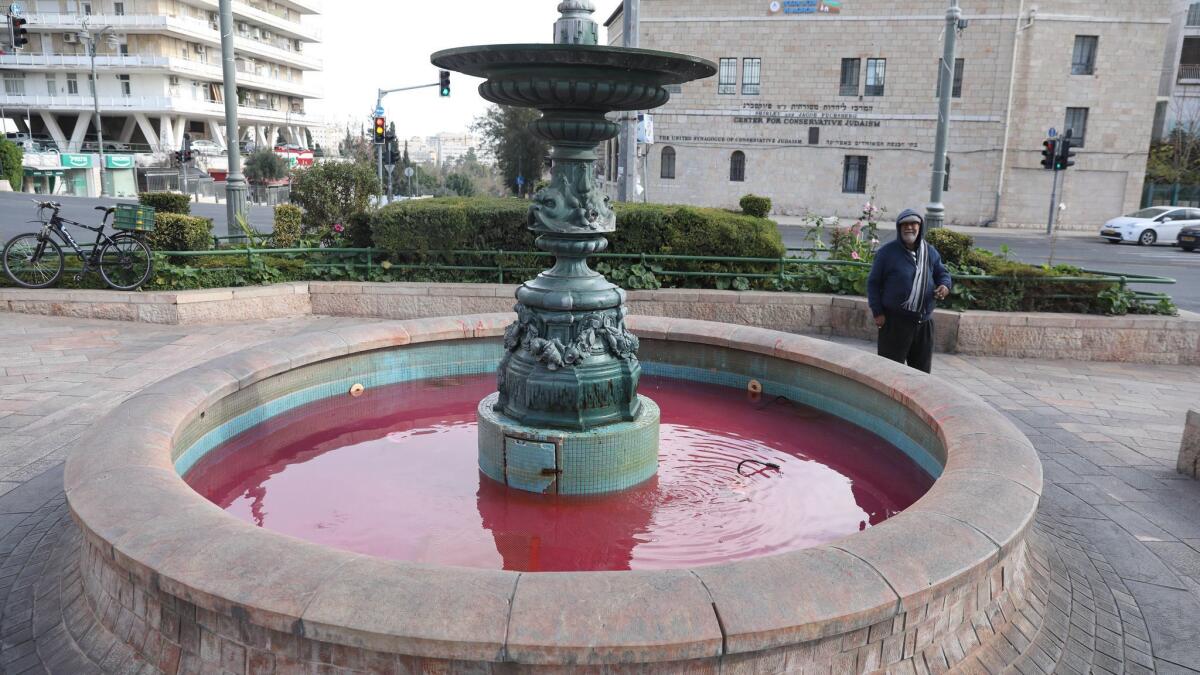Two girls’ deaths in Israel spur nationwide strike to protest inaction on violence against women

- Share via
Reporting from Jerusalem — Silvana Tsegai was a 13-year-old Eritrean asylum seeker living in Tel Aviv. Yara Ayoub was a 16-year-old high school student on her way to a friend’s party in Galilee. The bodies of the girls were found on the same day last week, slain by men they knew well, according to authorities.
In death, the girls may well bring Israel to a halt.
Silvana and Yara were the 23rd and 24th female victims of domestic violence to die this year in Israel, officials said. Their deaths have led to a week of protests and a nationwide “women’s strike” planned for Tuesday, to protest government inaction toward violence against women.
More than 200 companies and institutions have said employees may take the day off to participate. Organizers expect more than 100,000 to strike.
On the day Silvana and Yara were found, Nov. 26, the Israel Women’s Network issued a statement decrying “the terrible news that just keeps coming.”
Silvana was beaten to death by her mother’s former boyfriend in Tel Aviv, authorities say.
Yara, from the village of Jish, was found in a dumpster following a desperate search, five days after she disappeared. Three men and a woman believed to be members of her extended family have been arrested.
“This is an emergency that cannot be ignored,” the Israel Women’s Network said. “It’s time for the government to join the war for the lives of women in Israel.”
Perhaps taken from that initial statement, the new movement’s motto, “state of emergency,” has been scrawled everywhere from high school walls to, most prominently, the palms of women’s hands.
On Monday, opposition leader Tzipi Livni took to Instagram to post a picture of herself with other female legislators holding their arms out, inscribed palms forward. “I’m a woman and I’m going on strike,” the caption read.
For a week, Israelis have faced the two girls’ open faces on posters, on the front pages of newspapers and on television screens.
The nation’s cities have been awash with faux blood splattered on sidewalks or on urban walls — or spouting from fountains. In Jerusalem, water in the Paris Square fountain facing Prime Minister Benjamin Netanyahu’s official residence and in the Lions Fountain in the stately neighborhood of Yemin Moshe was dyed blood red.
According to statistics compiled by the Women’s International Zionist Organization, a feminist group, the number of women and girls killed since the beginning of 2018 is the highest since 2011.
In 2016 and 2017, 16 women were slain; and 13 were killed in 2014 and in 2015, according to the organization.
Netanyahu was taken to task for his government’s neglect of the matter by none other than his wife, Sara, who said she was shocked to learn that her husband had voted against the establishment of a parliamentary inquiry into the killing of women by family members.
During a Nov. 25 visit the couple made to a battered women’s shelter to mark International Day for the Elimination of Violence Against Women, the prime minister told the center’s director he had opposed the recent legislation because “I wasn’t paying attention,” adding, “It was an opposition proposal.”
As the visit was broadcast live on Israeli television, his wife, clearly upset, interjected that “on this issue, there really should be no coalition and opposition. It’s an issue we all share.”
The moment immediately went viral.
For a nation of fewer than 9 million people who are familiar with military threats from declared enemies but, despite social and political polarization, remain accustomed to relatively violence-free daily lives, the spike has come as a shock.
The deaths of the two girls, one an African migrant and the other a Muslim Arab, each a marginalized minority, have galvanized a movement.
Allison Kaplan Sommer, a columnist and analyst for the Israeli daily Haaretz who writes often on Israeli society, said a number of dynamics factored into the mass reaction, starting with the victims’ ages.
“The fact that they were children, no matter where they come from, has elicited a level of sympathy that grown women who are murdered don’t elicit,” she said. That their slayings brought the numbers of slain girls and women to a year-end high also contributed to the reaction.
However factionalized Israel is, Kaplan Sommer said, Israeli women’s organizations tend to bridge the Jewish-Arab gap. “It’s a small country with very cohesive communities; everybody knows everybody here. And access to guns is limited, so the impact here is much larger than it would be in the United States.”
Silvana and Yara had lively Instagram and Snapchat feeds that “have been all over TV stories,” Kaplan Sommer said. “They reminded people of their own kids.”
“They weren’t just a name and a photo.”
Tarnopolsky is a special correspondent.
More to Read
Sign up for Essential California
The most important California stories and recommendations in your inbox every morning.
You may occasionally receive promotional content from the Los Angeles Times.









